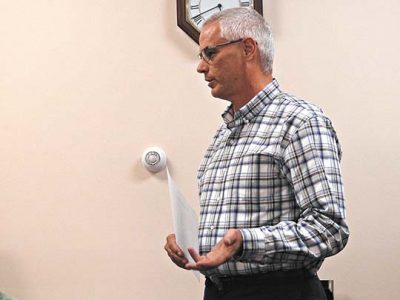Houghton County board votes against supporting Isle Royale closure
HOUGHTON — The Houghton County Board voted down a letter of support for closing down Isle Royale National Park for the summer Tuesday.
Coral Conway, chief ranger at Isle Royale, said the board’s decision would be passed along to the National Park Service in Washington, which help decide whether there would be further delays or total closure for the summer. As of now, the park opening has been delayed until June 15.
Conway told the board because most passengers arrive via ferry or seaplane, there is a heightened risk even if COVID-19 numbers drop significantly. One ferry passenger could pass the virus on to many others during the several-hour trip, she said.
“None of us want to see the island close, but none of us want to see a catastrophic situation where we have a lot of people who become ill and then we’re impacting our local communities as well,” she said.
The island is not equipped for an outbreak, having only an EMT on the island, Conway said. If people became ill, that would mean bringing them back to the mainland to be treated at UP Health Systems — Portage or Aspirus Keweenaw Hospital.
“Ther’s just not the resources to handle a large influx of patients if that were to happen,” she said.
The June 15 opening date means employees will start to show up in May to begin opening up the utility systems and training for the upcoming season. A final decision would have to be made by May 1, Conway said.
“These employees are coming from all over the country, and then of course when we open up the park, we have visitors coming from the whole world,” Conway said.
The park has to submit paperwork to the regional office by Friday. The regional NPS office would then consult with officials in Washington D.C. on a final decision.
The board voted 3-2 against a letter of support. Chairman Al Koskela, Vice Chair Tom Tikkanen and Commissioner Roy Britz voted against it, with Gretchen Janssen and Glenn Anderson voting for it — “very reluctantly,” in Anderson’s case.
Anderson said he was skeptical of closing because of the importance Isle Royale has to the area — for some people, it might be the first place they want to visit when travel restrictions are lifted, he said. However, he acknowledged the difficulties Conway brought up.
“That’s no place to be, on the island, if you get ill,” he said. “It’s somewhat of a quandary.”
Concessionaires are also concerned because of the number of cancellations, which could result in large financial losses, Conway said. The lodge would also have significant startup costs.
“It could be a situation where we have everything shut-down mid-season, including the captain on the ferry that could be ill, and maybe shut down transportation for an unknown amount of time,” she said.
All three transportation services servicing the island have applied for federal financial assistance; the seaplane operator has been approved, Conway said. However, that revenue may still not be enough to cover expenses, Conway said.
The boats to the island are operating on the side of caution, Conway said.
“They do not believe they have enough to justify the risk of their crew and captain getting exposed and having to shut down for the season,” she said.
Isle Royale’s remoteness puts it in a different position from most national parks, where people can arrive by car, Conway said. At Isle Royale, only 15% come by private boat, with the rest coming from a mix of ferry and seaplane.
Asked by Anderson how the park would handle people who came on personal boats if the park closed, Conway said if the lodge cannot operate, there would be no fuel services other than in a dire emergency.
“That would greatly limit the amount of boaters who could go out,” she said.
If the order prohibiting motorized boating is lifted, people would be able to go out for the day to fish, but the park would stay closed, she said. Night-time restrictions would still be in place because of the lack of emergency response resources and greater risk of nighttime use.
If the island is closed, there would be a limited skeleton staff of law enforcement personnel and maintenance staff for the law enforcement boats and utility systems.
Even if funds became available for a larger medical staff, it may be too late for hiring, which is usually done in the fall, Conway said. Many prospective employees have already dropped out because of the uncertainty.
There are also safety concerns regarding the dormitory-style housing for staff, Conway said.
A situation where concessions shut down but hiking and camping were allowed would still leave the island short-staffed for medical emergencies, Conway said.
Rescues have needed between 16 and 24 responders, depending on the location, Conway said.
“If we had a patient in a remote area that was exhibiting COVID, we’d definitely need more than 16 because they’d be required to wear N-95 respirators as well,” she said.






